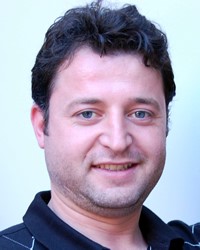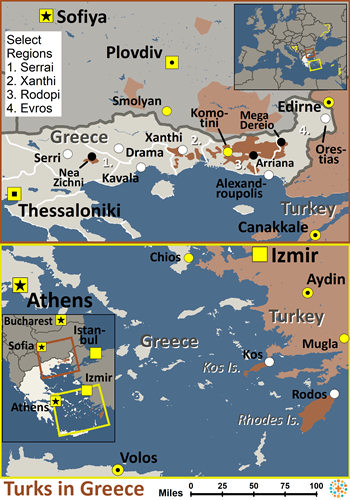Rumelian Turks are a remnant of the Ottoman Turks who migrated from their homeland in central Asia in the thirteenth century. Rumelian Turks conquered Anatolia and established the Ottoman Empire, which encompassed the Balkan Mountains, Arabia, North Africa, and eventually the Greek-based Byzantine Empire. The Ottomans conquered the Byzantine Empire in the mid 1400s, and there have been hard feelings between the Turks and the Greeks at various times ever since. The Turkish population in Greece is small, and it's mostly confined to the northeastern part of the country.
The Greek government has a policy of not referring specifically to the ethnic Turkish community but instead, they refer to their entire Muslim population as a whole. This has caused some consternation among the Turks in Greece, and it has called into question Greece's willingness to allow the Turks in their country to have their own ethnic identity. Lamb is a favorite meat of Turks. The most common way of preparing it is pilaf, where small bits of meat are cooked with rice and oil. Musaka (roasted meat and eggplant) and kapama (mutton with spinach and green onions) are other popular dishes. Turks are very fond of sweets and eat large quantities, especially the kind known as Turkish delights (gummy confections usually cut in cubes and dusted with sugar). Rumelian Turks are not supposed to drink alcohol because their Islamic belief forbids it. Instead, they drink much coffee and sour milk or yogurt, which they believe keeps them healthy. Since 2017 the Turkish government has been cracking down on those they deem a threat to their power. As a result, there have been Turks who have fled to Greece as political refugees. These Turks are often journalists and other professionals who are living off their savings and trying to keep a low profile.
Wherever they live Turks are Sunni Muslims. "Sunni," is derived from the Islamic term, sunnah, which means "well-trodden path. " Sunnis believe that the correct path is that of the majority. They believe that the One, Supreme God, Allah, spoke through his prophet, Mohammed, and taught mankind how to live a righteous life through the Koran and the Hadith. To live a righteous life, you must utter the Shahada (a statement of faith), pray five times a day facing Mecca, fast from sunup to sundown during the month of Ramadan, give alms to the poor, and make a pilgrimage to Mecca if you have the means.
Muslims are prohibited from drinking alcohol, eating pork, gambling, stealing, slandering, and making idols. They gather for corporate prayer on Friday afternoons at a mosque, their place of worship. Commonly, Turks identify with Sunni Islam as part of their identity, but they are usually not observant of all Muslim practices. This is especially true for Turks in diaspora like those in Greece.
The Bible and the JESUS Film have already been translated into the language of the Turks. However, only a small number of Greek Rumelian Turks are known to have put their faith in Christ. Prayer is the key to reaching them with the life-changing gospel.
Pray that the sheer wonder of knowing Jesus and the impact he has on their lives and the joy he brings spur believers to share Christ with the Turkish people in Greece.
Pray the hearts of the Turkish people would be stirred by a sovereign work of the Holy Spirit readying them for the time when they hear and respond to the gospel.
Pray Turks will experience dreams and visions of Jesus leading them into a saving relationship with him.
Pray for an unstoppable movement to Christ among the Turks in Greece.
Scripture Prayers for the Turk in Greece.
https://en.wikipedia.org/wiki/Turks_of_Western_Thrace
| Profile Source: Joshua Project |


























